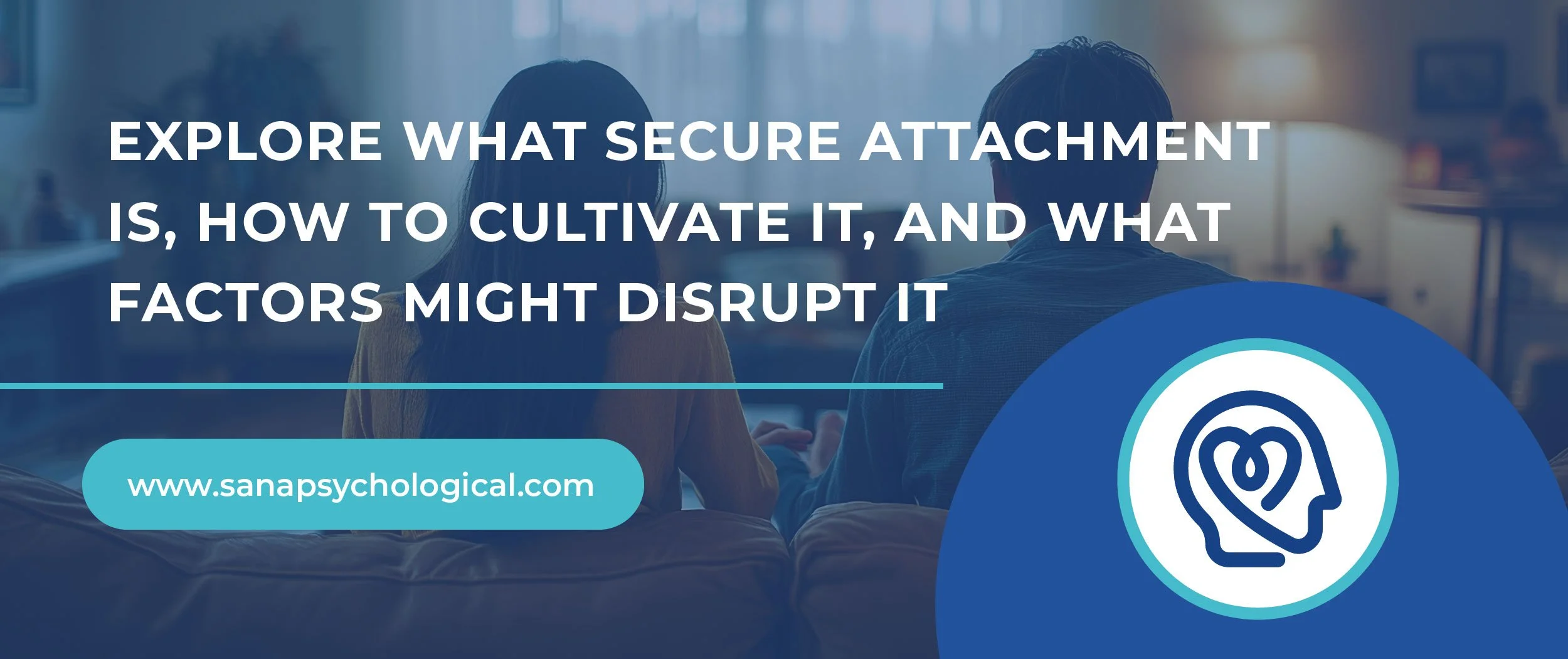Are You Securely Attached? Learn From Our Couples Counselling Calgary AB Experts
Attachment Styles have been all the buzz in the realm of self-help and psychology over the past few years. It’s always interesting when older theories become new and popular again.
In this blog, we will explore more about attachment, specifically focusing on how to build secure attachment. A lot of people exploring attachment tend to get stuck in the problem, rather than looking towards the future of healthy relationships. Attachment, while rooted in our early childhood experiences, can change as we experience different types of relationships.
Attachment: A Brief History From Couples Counselling Calgary AB Psychologists
Attachment theory, first developed by psychologist John Bowlby, highlights the profound impact that our early relationships, particularly with caregivers, have on our emotional development. The bonds we form in infancy and our first few years of life shape how we perceive and interact with the world, particularly in our adult relationships.
This theory, developed out of laboratory research with real children and their caregivers, demonstrated that, depending on the infant/young child’s relationship with their caregiver, they would behave and react differently to different scenarios, for instance, when the caregiver leaves the room or when they are forced to interact with a stranger. Out of the differing reactions that were observed, the model of Attachment Theory was created.
There are four main attachment styles, which our couples counselling Calgary AB therapists summarize as:
Secure: This is where people feel comfortable with intimacy and independence. They are able to form healthy, trusting relationships and are able to both rely on others and be relied upon. A secure style forms from caregiver relationships that are predictable, kind, consistent, and caring.
Anxious: This is where people crave intimacy and may also be overly dependent and fear abandonment or rejection. They often worry about the stability of their relationships and seek constant reassurance. This style forms from caregiver relationships that are unreliable, codependent, anxiety-ridden, and unpredictable.
Avoidant: This is a style where they value independence and may be uncomfortable with intimacy or emotional closeness. They may suppress their emotions and have difficulty forming close relationships, though still want them. This style forms from caregiver relationships that are distant, unavailable, and emotionally closed off, even if they are physically present and attending to logistical needs.
Disorganized: This is a style where they often desire intimacy but also fear vulnerability and may struggle with unpredictable behaviors in relationships. This style is often associated with a history of trauma or inconsistent caregiving
At the core of attachment theory is the concept of secure attachment, which lays the foundation for healthy emotional connections throughout life.
In this blog, our couples counselling Calgary AB psychologists explore what secure attachment is, how to cultivate it, and what factors might disrupt it.
What is Secure Attachment? Information From Couples Counselling Calgary AB Psychologists
Secure attachment refers to the bond that a child develops with their caregiver, which in turn influences how they navigate relationships as adults. Children with a secure attachment style feel safe to explore the world because they know they have a secure base to return to when needed. These children feel confident that their emotional needs will be met, which helps them build trust in themselves and others.
In adult relationships, a person with secure attachment:
Feels comfortable with intimacy and can open up without fear of rejection.
Is able to rely on others and be relied upon, maintaining a balance between closeness and independence.
Handles conflict effectively, remaining calm and cooperative rather than anxious or defensive.
Can trust and be trustworthy, maintaining healthy boundaries while still being emotionally available.
Secure attachment provides the emotional stability needed to thrive in both personal and professional relationships. But how do we build and maintain it?
Secure Attachment Quiz Created by Couples Counselling Calgary AB Therapists
Curious where you fall on the spectrum of attachment? Take our free quiz ‘Am I Securely Attached?’ to find out!
Based on your results, you will be redirected to learn more about healthy relationships using The Gottman Institute’s resources or to learn more about healing from insecure attachment and building healthy attachment in all of your connections.
How to Build Secure Attachment According to Couples Counselling Calgary AB Therapists
Whether you're trying to build secure attachment in your own life or foster it in relationships with others (like your children, friends, or partners), the process requires intention, patience, and empathy. Here are a few steps to help you get there:
1. Prioritize Emotional Availability
Being emotionally present is key to building secure attachment. Whether you’re caring for a child or engaging with a partner, emotional availability involves being fully present in the moment, listening actively, and being responsive to emotional cues.
In the context of parenting: Responding to your child's emotional needs consistently (when they are hurt, scared, or upset) builds trust. Children develop confidence when they know their feelings matter to their caregivers. Rather than telling their child “You’re fine,” try saying, “I understand you’re hurt, it’s okay to feel that.”
In adult relationships: Prioritize meaningful communication, give your partner space to express emotions, and make them feel heard and valued. According to our couples counselling Calgary AB therapists, this can sound like validation, empathy, and gratitude. For instance, “I hear that you are feeling ______. That sounds difficult. Thank you for sharing.”
2. Be Consistent and Predictable
Children need consistency in their caregivers' responses. Predictability builds a sense of safety and security. When a caregiver is consistently attuned to a child’s needs—showing love, offering comfort, and setting healthy boundaries—the child learns that the world can be a safe place.
For adults, consistency in your words and actions builds reliability and trust. If you say you’ll be there, be there. If you commit to something, follow through. Demonstrate your commitment to wanting to spend time with the other person and prioritize that. This also includes your relationship with yourself. A healthy and secure relationship with ourselves is a key building block to healthy relationships with others, as our couples counselling Calgary AB therapists remind their clients of often in therapeutic sessions. Reliability in all types of relationships fosters trust, strength, and comfort.
3. Foster Self-Worth
Secure attachment is rooted in the belief that we are worthy of love and care and it is not conditional (e.g., only available IF we act a certain way or do a certain thing). Encouraging self-worth in a child starts with positive reinforcement, validation, and nurturing care. Other suggestions for parents are here. When you build a child's self-esteem, they grow into adults who feel capable of forming secure bonds.
In adult relationships, self-worth is nurtured by mutual respect, validation, and encouragement. Other ideas for building self-worth are included in this article. Recognizing your partner’s efforts, expressing gratitude, and affirming their strengths helps them feel valued. With ourselves, it can look similar and our relationship and couples counselling Calgary AB therapists remind people to talk to themselves as they would to others. Typically the things we say to ourselves would not come out of our mouths with others as they are too unkind, so show up for yourself as you are with others and be that gentle, validating, encouraging support.
4. Encourage Emotional Expression
Encouraging and normalizing emotional expression is essential. It's important for children to feel safe to express their emotions without judgment or fear of retribution. This cultivates emotional intelligence and resilience.
For adults, emotional expression fosters intimacy. Partners who can openly talk about their feelings—whether it's joy, frustration, or vulnerability—create a deeper, more authentic connection. An activity that’s often suggested in couples counselling Calgary AB sessions is to schedule a daily feelings check-in where each person has a chance to share about how they’re doing (not just what happened in their day, but how they experienced it and how it feels). This is a key building block to secure attachment.
5. Build Secure Attachment Over Time
Developing secure attachment isn’t an overnight process, it’s a journey that involves patience and consistent effort over time. Whether you’re a parent, a partner or improving your relationship with self, be patient and allow the relationship to deepen naturally while making consistent, thoughtful efforts at change.
What Might Disrupt Secure Attachment? Factors According to Couples Counselling Calgary AB Therapists
Despite our best efforts, there are many factors that can disrupt the development or maintenance of secure attachment. These disruptions can happen during childhood or adulthood and may impact how we relate to others. Our couples counselling Calgary AB and parenting counselling Calgary therapists have put together a list of some of the main ways attachment can be disrupted:
1. Inconsistent Caregiving
Inconsistency in caregiving, whether physical or emotional, can hinder the development of secure attachment. If a caregiver is neglectful, emotionally unavailable, or unpredictable, the child may struggle to form trusting bonds. The child might develop anxious attachment (seeking constant reassurance) or avoidant attachment (keeping emotions at a distance).
In adulthood, inconsistent communication, broken promises, or unpredictable behaviors can lead to attachment insecurity, making it difficult to trust or connect with others.
2. Trauma or Abuse
Experiencing trauma or abuse, especially in childhood, can significantly impact attachment. Abuse (physical, emotional, or sexual) disrupts a child’s sense of safety and self-worth, often leading to attachment disorders. Trauma can cause individuals to either avoid emotional closeness or become excessively clingy and dependent.
Adults with a history of trauma may struggle with trusting others, fearing vulnerability, or overcompensating by pushing others away. Our couples counselling Calgary AB therapists help people determine if couple’s or individual therapy is the best fit for them based on their experiences and, if there is a history of trauma, it might make sense to take time for individual healing before exploring couple’s counselling.
3. Neglect or Emotional Unavailability
Emotional neglect, where a child’s emotional needs are ignored or dismissed, can lead to issues with attachment. Children who are raised in environments where they aren’t allowed to express their emotions or have them validated may grow into adults who struggle with emotional regulation. Click here for additional free resources on emotional regulation, put together by our team of experienced psychologists and couples counselling Calgary AB therapists.
In relationships, emotional unavailability from a partner can create feelings of isolation, resentment, and insecurity, ultimately breaking down secure attachment.
4. Insecure Attachment Models in Parents
A parent’s own attachment history plays a significant role in how they relate to their child. Parents with insecure attachment styles may unintentionally replicate those patterns in their own relationships. For example, a parent who struggles with avoidant attachment may not know how to provide emotional closeness to their child, perpetuating a cycle of insecurity. Couples counselling Calgary AB therapists will often ask a bit about how people were raised to get a sense of what patterns and modelling may have happened that may be impacting the relationship today.
5. Environmental Stressors
Chronic stress, financial instability, or major life disruptions can all interfere with attachment bonds. A caregiver who is preoccupied with their own struggles may find it challenging to emotionally connect with their child or partner. For adults, stress can lead to emotional withdrawal, poor communication, or difficulty in trusting others. For example, one of our couples counselling Calgary AB therapists was born into a family navigating bankruptcy where both parents were struggling to navigate the stress of this while setting up their own company. The distraction, stress, and their own trauma and parental modelling led to distance and inconsistent attention which had an inevitable impact on their parenting. The goal behind attachment is not to blame (we all do the best that we can), but to understand and then be able to change. Regardless of what happened before, we have the ability to change our behaviour and relationships now.
Do you want to learn more about what attachment style you have in different relationships (with parents, partner, and in general?). Our couples counselling Calgary AB psychologists encourage you to visit The Attachment Project to take their free attachment quiz and start learning more.
Summary From Couples Counselling Calgary AB Therapists
Building secure attachment is a process of creating safety, trust, and emotional connection. Whether you're a parent nurturing your child's emotional growth or an adult seeking to foster deeper relationships, the key lies in being emotionally available, consistent, and supportive.
However, it’s important to remember that attachment is not a one-size-fits-all concept. Some people may have faced significant challenges in their early lives and the journey toward secure attachment can be long and complex. Therapy, emotional regulation, emotional intelligence, mindfulness practices, and a commitment to emotional growth can all help individuals heal and build stronger, more secure relationships.
By fostering understanding, communication, and emotional safety, we can each build the foundation for healthy, lasting connections—whether with ourselves, our children, or our partners.
Paige Abbott collaborated on this article with some of her colleagues at Sana Psychological, a mental health and addiction recovery practice in Calgary, AB, Canada. We are passionate about working with couples and families, as well as individuals in a variety of specialties connected with mental health. We invite you to explore our website to learn more and learn about our team of therapists who are happy to help better your life today.
Looking for more free resources and information? Check out our Resources section and Blog for a wealth of tips, strategies, and fuel for thought.



